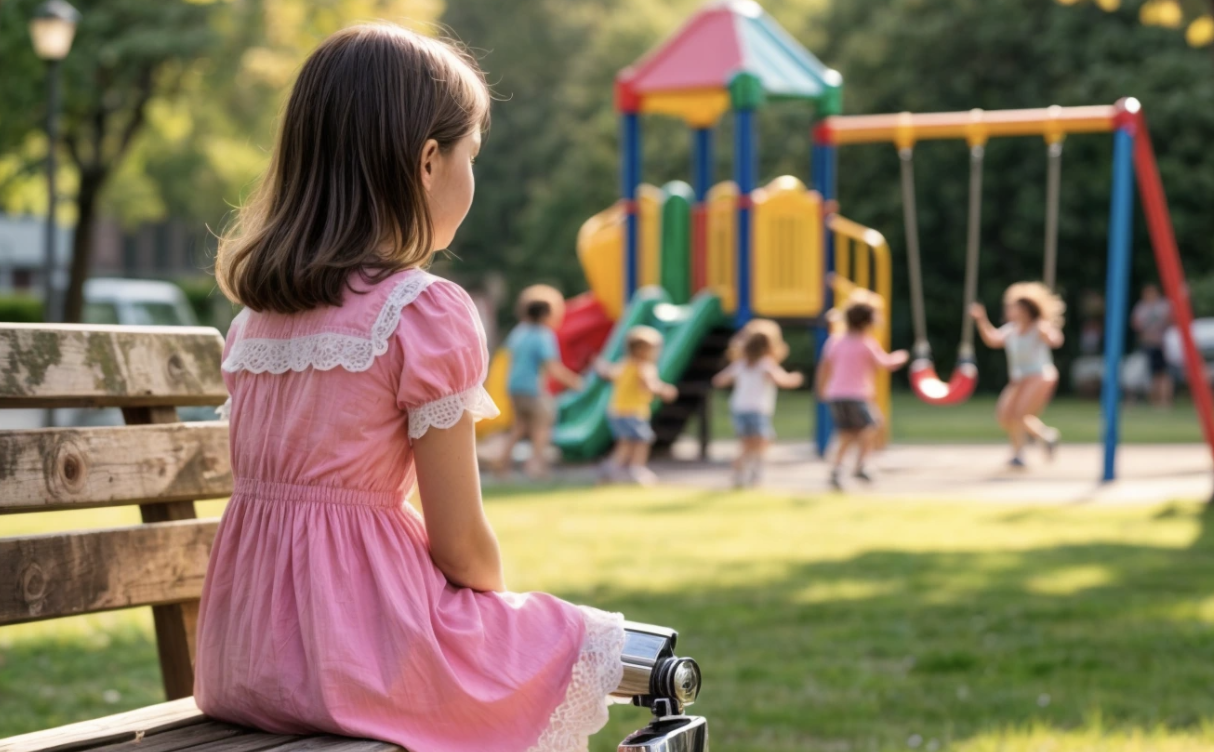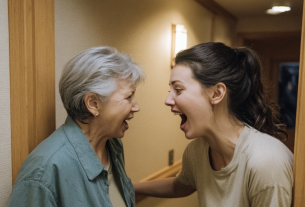No one wanted to play with little Alisa. Every morning, as she tied the bows on her dresses, her mother saw in her eyes a quiet, almost soundless hope that by evening invariably went out, like a candle in the wind. Although Alisa had the kindest smile in the whole world and eyes in which the warmest rays of summer sun seemed to live, the children on the playground always ran past her. They didn’t know why they did it. Perhaps they were held back by the barely audible whisper of adults, perhaps it was the herd instinct rejecting someone who was just a little different. But one thing was clear and indisputable: every day, Monday through Sunday, she sat on her usual wooden bench, watching the others race around, cry out with delight, and share secrets—while with all her heart she wished, just for a minute, to be at the center of that merry whirlwind.
She learned to be steadfast, not to show how tightly her little heart clenched when someone’s gaze was quickly averted, or when she caught scraps of whispers carried past on the wind. In her pretty dresses, with braids neatly plaited by her mother’s hands, she looked like a delicate porcelain doll, a princess from a forgotten fairy tale—only in real fairy tales princesses always have a loyal retinue, and she had no one.
Every morning, looking in the mirror, Alisa would quietly speak to herself, to her reflection: “What if today? What if today everything changes, and someone sees not this, but me?” And every evening, walking home, she would squeeze her father’s hand tightly, trying to keep the tears from running down her cheeks. Her father—Artyom Viktorovich—understood and felt everything perfectly. He was a man of means, the owner of a large construction company; his portraits graced the covers of glossy magazines, and his opinions were quoted in the news. But all his influence, all his capital proved powerless in the face of one single task—to build a small bridge to his only daughter’s happiness, to give her that simple, child’s happiness that can’t be bought for any amount of money.
He brought her to this park every Saturday without fail. He sat beside her, slowly sipping overly sweet coffee from a cardboard cup, watching closely. Sometimes he tried to cheer her with playful comments, and sometimes he simply sat in silence, shoulder to shoulder, letting her know he was there and he understood. But day after day nothing changed. Alisa smiled back at him, but in the depths of her eyes, so clear and bright, a constant shadow hid and lived—the shadow of a fear of remaining invisible, unwanted, alone forever.
And then one day, on an ordinary warm Saturday, when the air was filled with the scents of freshly cut grass, cotton candy, and something elusive that felt so much like hope, everything went by a completely different script. The park was seething and pulsing with life: kids were flying by on scooters and bicycles, lively dogs barked merrily, outpacing each other with ringing voices, and on the green lawn there was a real battle for the ball. And Alisa, like a wind-up roly-poly doll, sat on her bench. One tiny pink sneaker pressed against the ground, and the other was replaced by a neat, remarkably high-tech prosthesis that sparkled in the generous sunlight like polished silver.
Meanwhile, from the alley a man in a simple, slightly worn denim jacket entered the park. He was holding tightly the hand of a boy of about six. This was Denis. He was raising his son on his own—his wife, a bright and kind woman, had passed away two years earlier after a long illness. They lived very modestly, made do with the bare essentials, but their small apartment was full of warmth, mutual understanding, and real, sincere love. Their things were old, but what warm, radiant, truly living eyes they had!
Maxim—that was the boy’s name—immediately noticed a free swing.
“Dad, look, the swings are free!” he shouted with delight and had already lunged forward, but suddenly stopped in his tracks as if rooted to the spot, and slowly turned to his father.
“Dad, tell me, why does that girl always sit all by herself?” he asked softly, almost in a whisper; his eyes showed genuine childish curiosity and a drop of sadness he didn’t understand himself.
Denis looked carefully in the direction indicated; his gaze lingered for a second on the solitary figure in a pink dress.
“You know, son,” he began slowly and thoughtfully, “maybe she’s just waiting. Waiting for someone brave and kind to come up and invite her into their game.”
Maxim knitted his fair eyebrows; a whole storm of thoughts crossed his face as he weighed something and decided within his small but so wise heart.
“Can I… can I be that brave and kind one?” he finally breathed out, looking at his father with such trust that Denis’s heart gave a leap.
Denis smiled gently, and there was so much support and approval in his smile that Maxim’s spirits rose at once.
“Of course you can, my good boy. Go on, don’t be shy.”
Alisa saw an unfamiliar boy striding confidently across the green grass toward her. Something in her fluttered and clenched painfully inside: “He’ll come up, take a closer look, and run off just as quickly as all the others…”
“Hi!” Maxim said brightly, stopping right in front of her, so close that she could make out the freckles on his nose. “My name is Maxim. What’s yours? Want to play together?”
Alisa blinked in confusion, her big eyes not quite believing what was happening.
“My… my name is Alisa. I do want to. But I… I can’t always run fast…” She cast a quick, furtive glance at her prosthesis, expecting to see revulsion or fear.
Maxim only shrugged his thin shoulders, as if it were nothing at all.
“So what? My grandma, for example, is missing a tooth—and she’s still the funniest one and the life of every party!”
Alisa laughed—unexpectedly even to herself. It wasn’t a quiet, muffled chuckle, but a true, ringing, joyful laugh, warm as the gentlest summer sun. It came straight from the depths of her soul.
“Come on! We’re building a whole sandcastle with the guys over there!” Maxim said energetically, gesturing the way.
She rose carefully from the bench. The prosthesis clicked softly, shifting into working position. Alisa froze for a moment, expecting the boy to recoil or for his expression to change. But he simply waited patiently, looking straight into her eyes with calm friendliness, as if nothing unusual had happened.
They walked together toward the noisy sandbox. From all sides, glances fell on them—curious, surprised, wary. One worried mother quickly pulled her little one aside, whispering something in his ear. But Maxim either didn’t notice or didn’t care—he threw himself into the work with enthusiasm, patting tall walls out of damp sand and making it perfectly clear that what was happening was the most ordinary, natural thing in the whole wide world.
Alisa crouched beside him. At first her small hands trembled slightly, but soon her fingers burrowed, as they were used to, into the cool, grainy sand. At first her movements were slow and uncertain, but with each minute they gained speed and confidence. The fortress walls grew before their eyes; high towers with battlements appeared; they dug a deep moat, which they immediately filled with water from someone’s bottle. Alisa laughed, gave advice, and her laughter was so contagious! And then the real miracle happened—other children began to come over to them one by one. First a little tot in a cap, then a girl with bright red curls, then more and more. Someone handed them a bucket, someone simply plopped down nearby and began to help.
Only ten minutes had passed, and the whole big sandbox was already ringing with a many-voiced, happy laughter—with Alisa at its center.
In those moments Alisa was just Alisa. Not “the girl with the prosthesis,” not “the daughter of that businessman.” Just a girl who, as it turned out, was better than anyone in the world at making sandcastles with incredible lacy battlements.
On the bench, Artyom Viktorovich didn’t take his eyes off the sandbox. His half-finished coffee had long gone cold, turning into a sugary sludge. And down his cheeks—cheeks he didn’t even attempt to wipe—slow tears were rolling, not tears of sadness, but tears of boundless, overwhelming relief and quiet joy. Denis sat down beside him on the bench.
“You must be Maxim’s father?” Artyom Viktorovich was the first to break the silence; his voice trembled.
“Yes, that’s right—Denis. Very nice to meet you.”
“Artyom Viktorovich. Alisa’s father. Thank you… Thank you from the bottom of my heart. To you and your wonderful son. You can’t imagine what this simple step means for my little girl.”
Denis clasped his outstretched hand gently but firmly.
“There’s really nothing to thank us for, honestly. Sometimes in life things are very simple: you just have to pay more attention to the people around you, be there. And not be afraid to go first, to reach out when it’s needed.”
Artyom Viktorovich nodded silently, his gaze fixed on Alisa again. She was laughing with her head thrown back, and that laughter was so genuine, so cleansing, it seemed to chase all the clouds from the sky.
“I always thought money could solve any problem,” he said quietly, more to himself. “But it turns out everything that truly matters, everything most precious, is absolutely free. You can’t buy it in any store.”
Denis smiled knowingly, watching his frolicking son.
“And our children, well, they exist to keep reminding us adults of that simple and very wise truth.”
From then on, every Saturday Alisa and Maxim were inseparable friends. Their shared laughter and cheerful shouts became an integral, familiar, and joyous part of the park’s soundscape. And the two families—so completely different in social status and lifestyle—suddenly grew close and became one big, friendly company. The other parents gradually stopped whispering behind their backs, stopped tugging their children away. The children slowly stopped avoiding Alisa, seeing how confident and at ease she was. Alisa blossomed and became the soul of the entire playground. She was always the first to lend a hand, to suggest a new game, to approach newcomers shyly lingering by the entrance.
And one day, when the sun was already sinking toward the horizon, tinting the sky in tender peach and lilac hues, Artyom Viktorovich, watching the children play, said to Denis:
“Denis… Your boy, your Maxim, gave my daughter something I couldn’t give her all these years. Something you can’t buy for all the millions in the world. Ordinary childhood happiness.”
Denis looked carefully at Alisa, who at that moment was animatedly explaining something to a group of kids, gesturing with her hands.
“You know, Artyom Viktorovich,” he answered thoughtfully, “she gave my Kostya something very important, too. She opened up another, very important side of our world to him. The one where people are valued not for how they look on the outside, but for who they are inside, in the very depths of their souls.”
And Alisa—the very same girl who once sat alone on the old bench in the shade of a sprawling maple—now ran forward boldly, toward a new day and new adventures. Beside her, not falling a step behind, ran her loyal friend. And in her eyes, so clear and deep, the sun shone brightly again. Only now she understood and knew the most important secret: this sun can be lit from within, with nothing but kindness and faith in the miracle that is always somewhere nearby.



